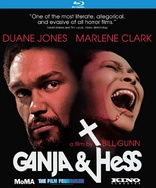Ganja & Hess Blu-ray Movie
HomeGanja & Hess Blu-ray Movie 
Kino Lorber | 1973 | 113 min | Rated R | May 08, 2012Movie rating
6.1 | / 10 |
Blu-ray rating
| Users | 0.0 | |
| Reviewer | 3.0 | |
| Overall | 3.0 |
Overview
Ganja & Hess (1973)
Dr. Hess Green, an archaeologist overseeing an excavation at the ancient civilization of Myrthia, is stabbed by his research assistant, who then commits suicide. When Hess wakes up, he finds that his wounds have healed, but he now has an insatiable thirst for blood. It turns out that the knife he was stabbed with carried ancient germs that have turned him into a vampire. Soon after, Hess meets his former assistant's wife, Ganja. Though Ganja is initially concerned about her missing husband, she soon falls for Hess. Though they are initially happy together, Ganja will eventually learn the truth about Hess, and about her husband. Will she survive the revelation? Will Hess?
Starring: Marlene Clark, Duane Jones, Bill Gunn, Leonard Jackson, John HoffmeisterDirector: Bill Gunn
| Horror | 100% |
Specifications
Video
Video codec: MPEG-4 AVC
Video resolution: 1080p
Aspect ratio: 1.67:1
Original aspect ratio: 1.66:1
Audio
English: LPCM 2.0
Subtitles
None
Discs
25GB Blu-ray Disc
Single disc (1 BD)
Playback
Region A, B (C untested)
Review
Rating summary
| Movie | 3.0 | |
| Video | 3.0 | |
| Audio | 3.0 | |
| Extras | 3.0 | |
| Overall | 3.0 |
Ganja & Hess Blu-ray Movie Review
The Passion of a Hired Gunn
Reviewed by Casey Broadwater May 9, 2012Ganja & Hess has been saddled with a lot of misconceptions since its 1973 debut, so it's probably helpful to start by describing what the film
isn't--a typical blaxploitation horror movie. That's what it was initially supposed to be, but director Bill Gunn had other, more ambitious
ideas. Hoping to ride the success of Blacula, upstart indie production company Kelly-Jordan Enterprises hired Gunn, an off-Broadway actor and
playwright, to make another campy, low-budget black vampire movie for "urban" audiences. What Gunn turned in, however, was more arthouse than
grindhouse, a lyrical, almost Bergman-esque reflection on addiction, religion, and contemporary African-American culture.
It debuted to a standing ovation at Cannes--where it was prematurely listed as one of the best American films of the decade--but when the movie
made its New York premiere, it was trashed by critics and pulled from theaters in less than a week. Worse, it was sold to another distributor, drastically
recut, and re-released in bastardized form under more exploitive titles like Blood Couple and Black Evil. The original version eventually
became the stuff of African-American cinema legend--the black horror equivalent of The Magnificent Ambersons--and for years the only way to
see it was a rarely screened print owned by the Museum of Modern Art. When Gunn's cut was finally restored in the late 1980s, the film was the
subject of much critical revisionism, with some claiming it as a forgotten masterpiece and others wondering if it had ever been worth the hype.
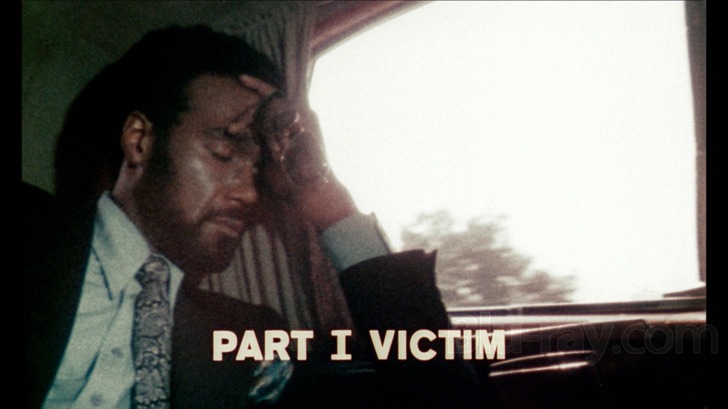
Hess
While this is technically a vampire movie, you'll never once hear the V-word uttered. Gunn saw his assignment--to make the next Blacula--as a chance to take a "genre" movie and turn it into a vehicle for social commentary. It seems appropriate, then, that he chose as his protagonist Duane Jones, who starred five years before in another subversive horror film, George Romero's Night of the Living Dead, which uses a zombie outbreak as a metaphor for us-versus-them race relations. Ganja & Hess, however, is more of an us-versus-us story, examining strains within African-American culture, from the unease between rich and poor blacks, to the tension between a tribal, pagan past and a Christianity inherited from slave masters.
Jones plays Dr. Hess Green, a character that immediately stands apart from typical black roles from the period--gangsters, pimps, and vigilante cops. Hess is well-educated and well-to-do, a polyglot and anthropologist who studies African tribal culture, lives in plush house, and gets driven around in a status-symbol Rolls Royce. His new assistant George, however--played by Gunn himself--turns out to be suicidally deranged, stabbing Hess with an ancient knife and then shooting himself in the chest. The wound from the ceremonial dagger--once used by an African blood cult--gives Hess immortality, but it also turns him into a compulsive sanguinarian. Gunn studiously avoids the usual vampire cliches--bats and garlic, aversion to sunlight, etc.--and makes Hess more of a blood junkie, robbing hospital plasma banks and surreptitiously murdering prostitutes to get his fix. Later, George's wife Ganja (Marlene Clark) arrives from Amsterdam looking for her missing husband, only to fall in love with Hess and be similarly transformed.
The film is less about the horror mechanics of its thin plot--there are no real "scares" here--than the dreamlike mood it strikes and the quasi- philosophical conversations held by its characters, who each seem symbolically loaded and representative of some subsection of 1970s black culture. Gunn bookends the film with scenes shot inside a Pentecostal church, and the spiritual delirium of the climax--an alter-call conversion followed by a self-sacrifice literally in the shadow of the cross--is striking and transcendent, recalling directors like Dreyer and Bergman, who also explored the conflicts of faith. But elsewhere, Gunn's direction is limp and tedious, and the film has an unavoidably amateurish quality.
A balanced approach to Ganja & Hess, I think, is to recognize its historical importance as one of the few mindfully artful African-American films of the '70s, while not ignoring the fact that--in many ways--it's rather incompetently made, the work of a first-time filmmaker with ambitions his unproven directorial skills couldn't quite match. Gunn is often heroified for slyly commandeering the system, using Kelly-Jordan's money to make his own debut feature--one that attempts to subvert ideas about what a "black" film was and is supposed to be--and the story of the making of the movie does have a certain rob from the rich, give to the audience charm. But this mythologizing of Gunn as some sort of rogue auteur inevitably gives Ganja & Hess a status it probably wouldn't have if we were to only look at the film itself, and not the circumstances around its creation. For as compelling as the movie is on a number of levels--as a mood piece, a new take on the vampire story, a Christianity-meets-African tribalism dialectic--it's continuously hindered by a low budget and poor technique. (Especially the editing, which is confusing and sometimes needlessly non-linear.) It's tempting to mentally create an idealized version of the film, extolling the potential of Gunn's ideas while overlooking his nuts-and-bolts inadequacies, and that's usually what those who champion Ganja & Hess are forced to do.
Ganja & Hess Blu-ray Movie, Video Quality 
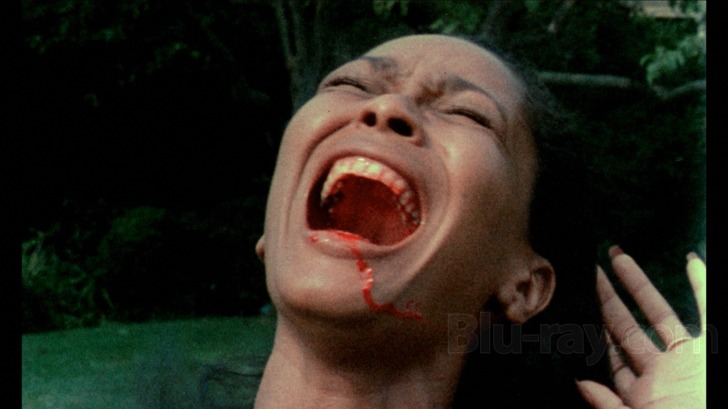
As you might imagine, Ganja & Hess isn't in the best shape now and was probably never in that great of shape even when it first debuted. The film was shot on gritty 16mm, mercilessly chopped up by its distributors, and later only existed in its original form via a few beat up and worn out prints. These have been used to create a 1080p/AVC-encoded Blu-ray presentation that, at best, might be described as "faithful to source." The picture is covered in a heavy, buzzing layer of grain--at least there's no DNR filtering--and from start to finish the print is filled with specks, scratches, and the shadows of bits of hair that were stuck in the camera gate. The film might be finally restored to its original runtime, but the image itself hasn't been cleaned up much, if at all. Since a 16mm negative has effectively half the surface area of a 35mm frame, you shouldn't expect a high level of clarity, but even among 16mm productions this picture is seriously soft. (Although, simply remastering it in high definition brings out a level of heretofore unseen detail.) Color is quite dingy too, with black levels that either look faded with age or overly crushing thanks to underexposure and poor lighting. Still, Kino's encode holds up with no major compression issues, and barring some sort of costly frame-by-frame restoration in the future--which is unlikely--this might very well be the best Ganja & Hess will ever look.
Ganja & Hess Blu-ray Movie, Audio Quality 
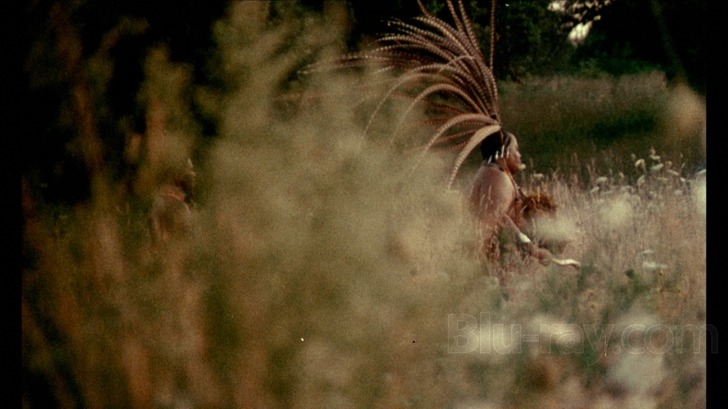
The disc's uncompressed Linear PCM 2.0 track sounds just as lo-fi as the picture looks, although, to be fair, the audio was probably poorly recorded in the first place. Dialogue is often crackly and muffled--sometimes even borderline incoherent--and there's a low but persistent tape hiss that runs throughout nearly the entire film. One of the most striking elements of Ganja & Hess, of course, is Sam Waymon's nightmarish score, which combines African chanting with echo effects and strange droning, and the music also has a tendency to sound overdriven and brash. The mix isn't what I'd call easy on the ears, but I suspect Kino did all they could here. Well, almost all. There are no subtitle options whatsoever, which is unfortunate for those that might want or need them.
Ganja & Hess Blu-ray Movie, Special Features and Extras 
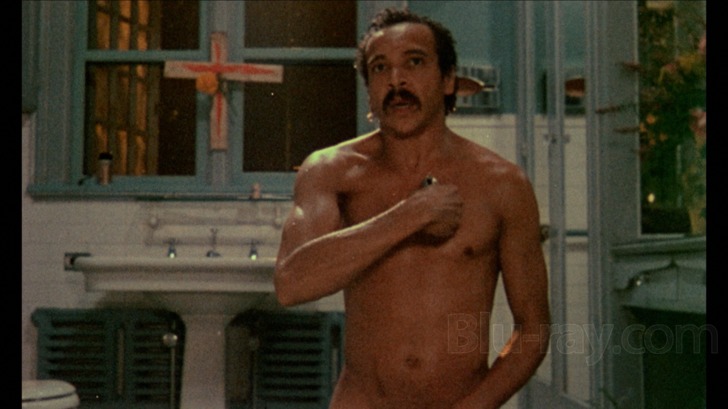
The disc basically ports over the main features from the 1998 DVD release, including an audio commentary and a retrospective "documentary," which is really just a half-hour collection of poorly recorded interviews.
- Audio Commentary: Producer Chiz Schultz, actress Marlene Clark, composer/actor Sam Waymon, and cinematographer James Hinton sat down in 1998 to reminisce about the film. Certainly worth a listen for fans and black cinema scholars.
- The Blood of the Thing (SD, 29:41): Film historian David Kalat leads an interview-based documentary about Ganja and Hess, produced for the 1998 DVD release of the film.
- Gallery (1080p): A fantastic user-directed gallery with 32 stills.
- BD-Rom Content: Original screenplay by Bill Gunn and Video Watchdog article by David Walker and Tim Lucas. Only accessible on a computer with a BD-ROM drive.
Ganja & Hess Blu-ray Movie, Overall Score and Recommendation 
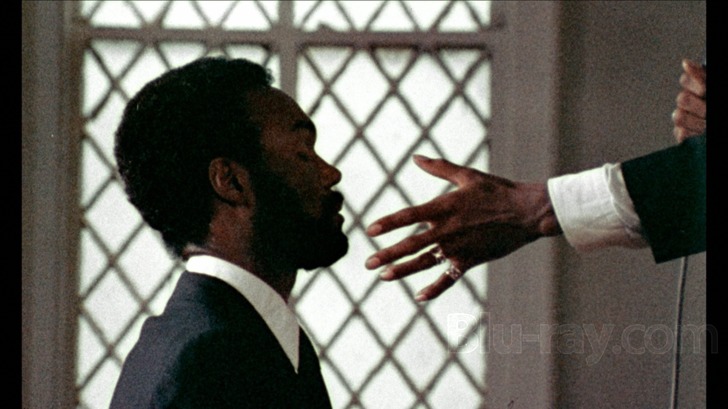
A mythology has developed around Ganja & Hess, positing it as a lost masterpiece of black cinema, and while it certainly deserves to be seen and studied and celebrated as the most atypical blaxsploitation pic of its era, it's hard to ignore the film's serious flaws. This is one of those cases where the movie is perhaps more interesting to talk/read/write about than it is to actually watch. Kino's Blu-ray release is probably the best the film has looked and sounded since it's debut, and while that's really not saying much, fans will appreciate the newfound high definition clarity. Recommended for diehard cult horror collectors only.
Similar titles
Similar titles you might also like

Poor Pretty Eddie
1975

Vampyros Lesbos
Special 2-Disc Limited Edition
1971

Rabid 4K
Collector's Edition
1977

Blacula
1972

House on Straw Hill
Exposé / Trauma
1976

Horrors of Malformed Men
江戸川乱歩全集 恐怖奇形人間 / Edogawa Rampo zenshû: Kyôfu kikei ningen
1969

Phase IV 4K
1974

Seizure
1974

God Told Me To 4K
1976

Invasion of the Blood Farmers
1972

We Are Still Here
2015

Nanny
2022

Black Sunday 4K
The Mask of Satan / La maschera del demonio 4K
1960

Dachra
Slipcover in Original Pressing
2018

Ju-on: The Grudge 2
Ju-on 2
2003

The Mephisto Waltz
1971

Satan's Black Wedding
Brother of the Vampire
1976

Baron Blood
Gli orrori del castello di Norimberga
1972

The Long Hair of Death
I lunghi capelli della morte
1964

The Blood Spattered Bride
La novia ensangrentada
1972
